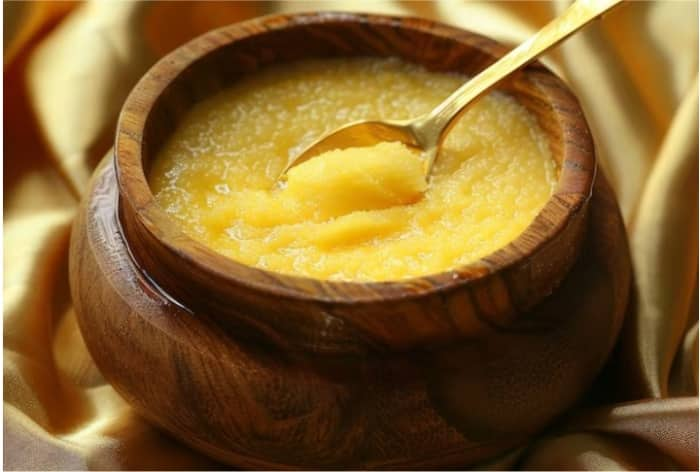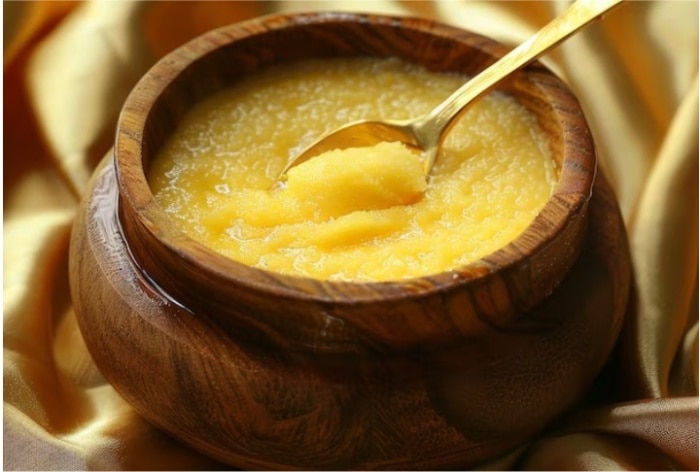In this article, we have discussed how ghee can be beneficial during the monsoon and contribute to overall gut health.

Ghee, a form of clarified butter commonly used in Indian cuisine, is often celebrated for its numerous health benefits. During the monsoon season, when the risk of digestive issues is higher due to increased humidity and the prevalence of waterborne diseases, ghee can play a crucial role in maintaining gut health. Here’s a closer look at how ghee can be beneficial during the monsoons and contribute to overall gut health.
Ghee is made by simmering butter to remove the water content and milk solids, leaving behind pure butterfat. This process not only enhances its flavor but also increases its shelf life and stability at high temperatures. Rich in vitamins A, D, E, and K, ghee is also a source of healthy fats, including butyrate, a short-chain fatty acid beneficial for gut health. Mr. Ravin Saluja, director with STERLING AGRO INDUSTRIES LIMITED( Nova Dairy Products) shares benefits of desi ghee for gut health and how to incorporate into your diet.
Ghee and Gut Health
1. Rich in Butyrate
Butyrate is a short-chain fatty acid produced when beneficial bacteria in the gut ferment dietary fiber. Ghee contains a significant amount of butyrate, which serves as a primary energy source for colon cells and plays a critical role in maintaining the health of the intestinal lining. Butyrate helps reduce inflammation in the gut, supports the integrity of the gut barrier, and can improve symptoms of inflammatory bowel diseases like Crohn’s disease and ulcerative colitis.
2. Supports Digestion
Ghee stimulates the secretion of stomach acids, aiding in the efficient digestion of food. This is particularly important during the monsoon season, when digestive processes can become sluggish due to high humidity and a lack of physical activity. Incorporating ghee into your diet can help maintain optimal digestive function and prevent issues like bloating, indigestion, and constipation.
3. Antimicrobial Properties
The fatty acids in ghee, including butyrate, have antimicrobial properties that help combat harmful bacteria in the gut. During the monsoons, the risk of infections from contaminated water and food is higher. Consuming ghee can help protect the gut from these pathogens and support the growth of beneficial bacteria, maintaining a healthy microbial balance.
4. Enhances Nutrient Absorption
Ghee helps in the absorption of fat-soluble vitamins (A, D, E, and K) and other essential nutrients from the food you eat. This is crucial during the monsoons, when the body’s immunity can be compromised. By enhancing nutrient absorption, ghee ensures that your body receives the necessary vitamins and minerals to strengthen the immune system and maintain overall health.
How to Incorporate Ghee During Monsoons
1. Cooking with Ghee
One of the simplest ways to incorporate ghee into your diet is by using it for cooking. Ghee’s high smoke point makes it ideal for sautéing, frying, and baking. You can use it to prepare traditional monsoon dishes like khichdi, a comforting and easily digestible meal made with rice and lentils, or add it to soups and stews for a rich flavor and additional health benefits.
2. Adding Ghee to Beverages
Ghee can be added to hot beverages like herbal teas or milk. A popular monsoon drink is turmeric milk, made with warm milk, turmeric, and a teaspoon of ghee. This soothing beverage not only supports gut health but also boosts immunity and provides anti-inflammatory benefits.
3. Using Ghee as a Spread
Instead of butter or margarine, use ghee as a spread on your toast or roti. It adds a delicious flavor and provides the benefits of healthy fats. Pair it with honey or spices like cinnamon for a tasty and nutritious snack.
4. Incorporating Ghee in Desserts
Many traditional Indian desserts made during the monsoons, such as halwa or ladoos, use ghee as a key ingredient. These treats, when consumed in moderation, can offer the health benefits of ghee while satisfying your sweet tooth.
Precautions and Moderation
While ghee has numerous health benefits, it is still a form of fat and should be consumed in moderation. Excessive consumption can lead to weight gain and other health issues. It’s also important to ensure that you are using high-quality, organic ghee to avoid any potential contaminants.
Ghee is a versatile and beneficial addition to the diet, particularly during the monsoon season, when gut health can be vulnerable. Its rich content of butyrate, antimicrobial properties, and ability to support digestion and nutrient absorption make it an excellent choice for maintaining gut health. By incorporating ghee into your daily diet, you can enjoy its numerous health benefits while savoring its rich, buttery flavor. Remember, moderation is key to reaping the benefits of this golden elixir without overindulging.

